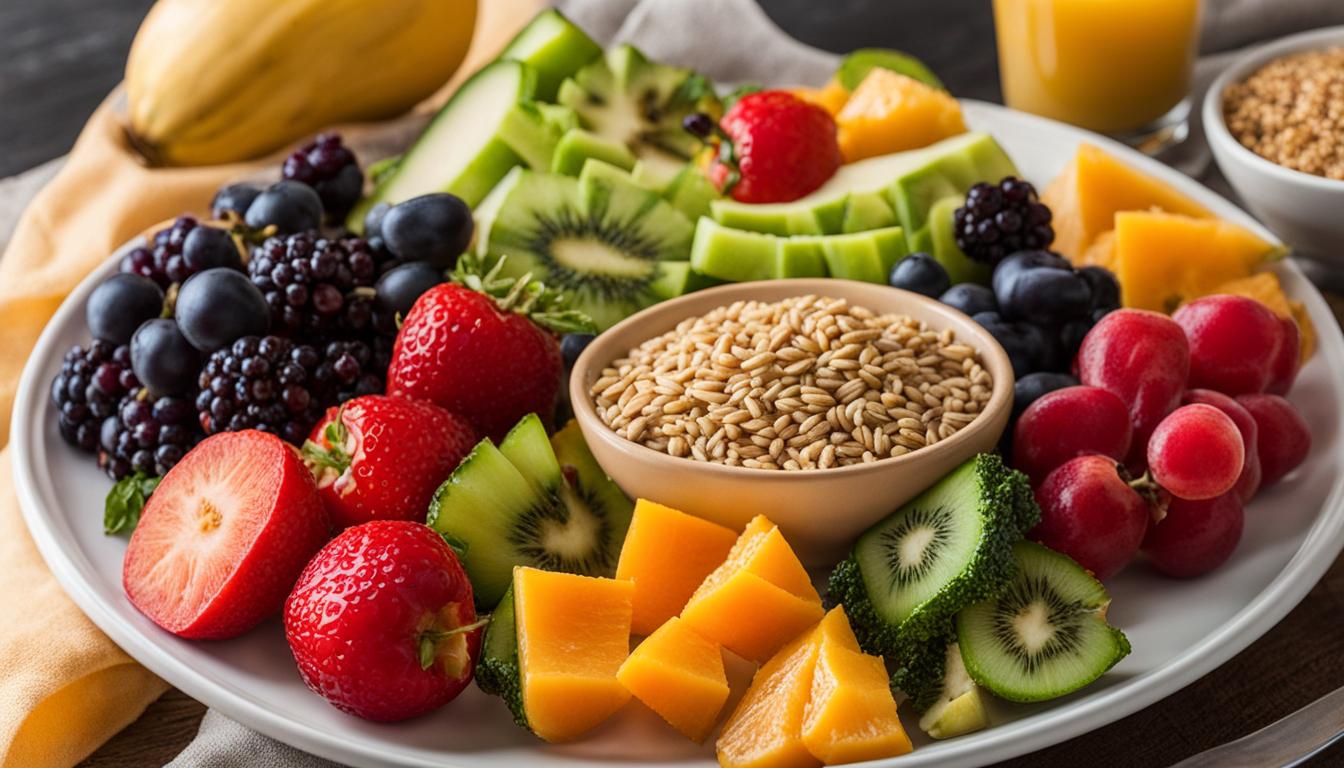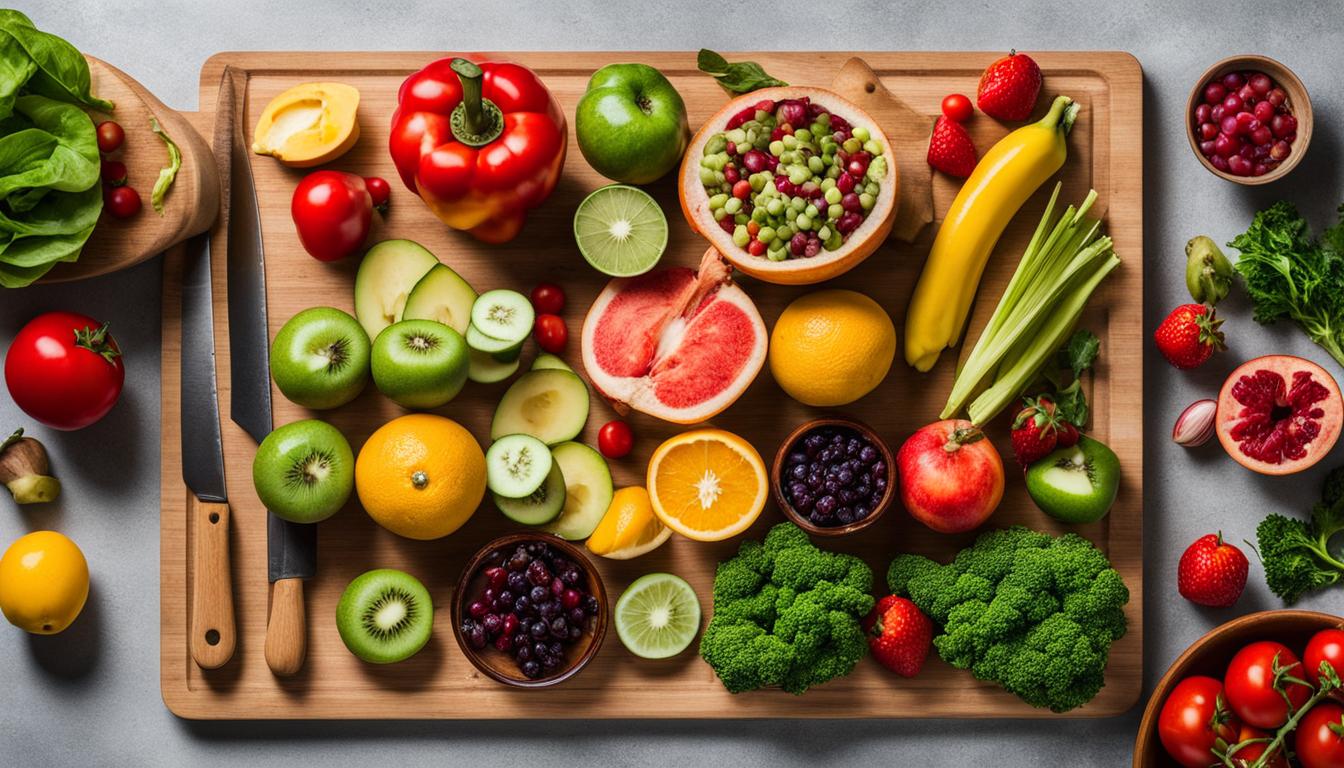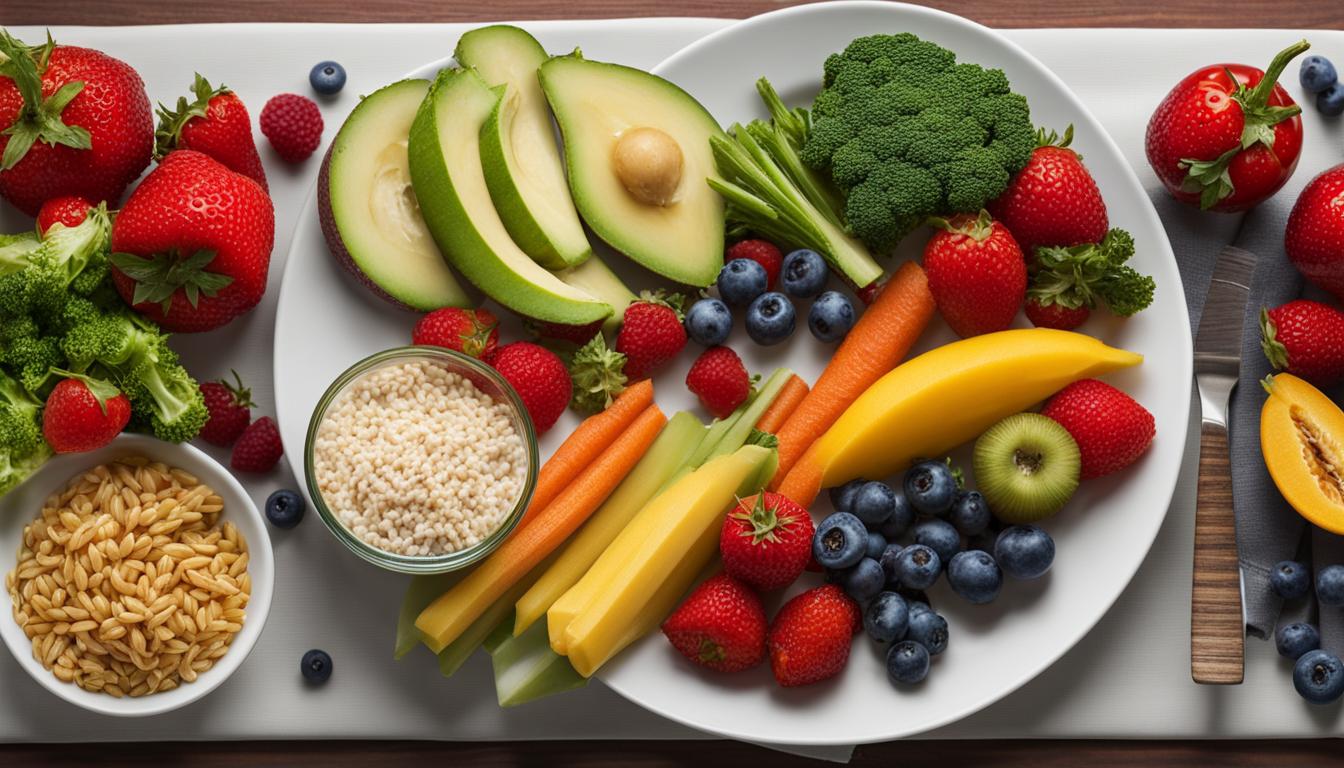Maintaining a balanced diet is essential for a healthy life. It provides numerous benefits, including improved energy levels, boosted immunity, and reduced risk of chronic diseases. In this ultimate guide, we will provide you with tips and tricks for healthy eating to help you achieve a balanced diet and optimize your overall health.
Key Takeaways:
- Follow these healthy eating tips to develop a balanced diet
- Nutrition tips to help you optimize your overall health
- Create a diet plan that suits your needs and promotes a healthy lifestyle
- Avoid processed foods and sugary beverages for better nutrition
- Monitor portion sizes and stay active to maintain a balanced diet
What is healthy eating?
Healthy eating is all about consuming a nutritious diet that includes a variety of foods from different food groups. It involves fueling your body with the right nutrients to support overall health and well-being. By prioritizing nutrient-dense foods and making mindful choices about what you eat, you can optimize your nutrition and promote a balanced diet.
When it comes to healthy eating, it’s important to include a wide range of foods in your diet. This means incorporating whole grains, fruits, vegetables, lean proteins, healthy fats, and low-fat dairy products into your meals. These foods provide essential vitamins, minerals, fiber, and antioxidants that support various bodily functions and help prevent chronic diseases.
On the other hand, it’s crucial to limit or avoid highly processed and sugary foods, as well as foods high in saturated and trans fats, sodium, and cholesterol. These types of foods can contribute to weight gain, inflammation, and an increased risk of health issues. By being mindful of your food choices and opting for nutritious options, you can maintain a healthy eating pattern that promotes overall wellness.
Importance of Each Food Group
Eating a balanced diet that includes a variety of nutrient-rich foods from each food group is essential for maintaining optimal health. Each food group plays a crucial role in providing the body with the necessary nutrients it needs to function properly. By understanding the importance of each food group, you can make informed choices that support your overall well-being.
The Benefits of Fruits and Vegetables
Fruits and vegetables are low in calories and high in fiber, vitamins, minerals, and antioxidants. They provide essential nutrients that support a strong immune system, promote healthy digestion, and reduce the risk of chronic diseases. Incorporating a variety of colorful fruits and vegetables into your diet can help improve energy levels, support weight management, and enhance overall vitality.
The Power of Whole Grains
Whole grains are an excellent source of fiber, which aids in digestion and helps regulate blood sugar levels. They are also rich in important nutrients such as B vitamins, iron, and magnesium. Consuming whole grains, such as brown rice, quinoa, and whole wheat bread, can help reduce the risk of heart disease, maintain a healthy weight, and support overall gut health.
The Role of Protein
Protein is vital for muscle repair and growth, as well as the production of enzymes and hormones in the body. Including lean sources of protein, such as poultry, fish, tofu, and legumes, in your diet can help maintain muscle mass, support satiety, and promote healthy weight management. Additionally, protein is essential for the development and repair of tissues, making it an important nutrient for overall health and well-being.
The Benefits of Healthy Fats
Healthy fats, such as those found in avocados, nuts, and olive oil, provide numerous health benefits. They help support brain health, reduce inflammation, and aid in the absorption of fat-soluble vitamins. Including sources of healthy fats in your diet can help maintain proper hormone function, support heart health, and promote optimal brain function.
The Importance of Dairy Products
Dairy products, such as milk, cheese, and yogurt, are rich in calcium, vitamin D, and protein, which are essential for strong bones and teeth. Consuming adequate amounts of dairy products can help prevent osteoporosis and support overall bone health. If you are lactose intolerant or follow a vegan diet, there are plenty of non-dairy alternatives that can provide similar nutritional benefits.

By incorporating a variety of nutrient-rich foods from each food group into your diet, you can ensure that your body receives the necessary vitamins, minerals, and other essential nutrients it needs to thrive. Remember to choose whole, unprocessed foods whenever possible and aim for balance and moderation in your eating habits. Eating a balanced diet is a key component of a healthy lifestyle and can contribute to improved overall well-being.
What is a balanced diet?
A balanced diet is a key component of a healthy lifestyle, providing the necessary nutrients to support optimal physical and mental well-being. It involves consuming a variety of nutrient-dense foods from different food groups, ensuring that your body receives a broad spectrum of vitamins, minerals, and essential nutrients.
When planning a balanced diet, it’s important to include fruits, vegetables, whole grains, lean proteins, and healthy fats. These foods provide the necessary energy, promote proper digestion, and support various bodily functions.
By following a balanced diet, you can maintain a healthy weight, reduce the risk of chronic diseases, and enhance overall vitality. It’s essential to limit highly processed foods, sugary beverages, and foods high in saturated and trans fats to optimize the nutritional value of your meals. Incorporating healthy recipes into your meal planning can help you stay on track and make nutritious eating enjoyable.

Overall, a balanced diet is the foundation of a healthy lifestyle. It allows you to nourish your body with essential nutrients, promoting longevity and vitality. By prioritizing meal planning and incorporating healthy recipes into your routine, you can easily maintain a well-rounded and nutritionally optimal diet.
Sample balanced diet
When it comes to maintaining a balanced diet, it’s essential to have a clear understanding of what a well-rounded, nutritious meal looks like. Here’s a sample balanced diet that can help with weight loss and promote overall health:
Breakfast:
- Start your day with a whole wheat English muffin topped with a poached egg and turkey bacon. This combination provides a good balance of protein, fiber, and healthy fats to keep you energized throughout the morning.
- Pair your breakfast with a serving of fresh fruits like berries or sliced melon. Fruits are packed with essential vitamins, minerals, and antioxidants that contribute to overall wellness.
Lunch:
- For a satisfying midday meal, enjoy a mixed greens salad topped with grilled chicken breast. The leafy greens provide important nutrients, while the lean protein from chicken helps with muscle repair and satiety.
- Add a variety of colorful vegetables to your salad for added fiber and micronutrients. Consider including options like cherry tomatoes, cucumber slices, and shredded carrots.
Dinner:
- Opt for a dinner option like grilled salmon served with roasted sweet potato wedges. Salmon is rich in omega-3 fatty acids, which have numerous health benefits, while sweet potatoes provide complex carbohydrates and essential vitamins.
- Include a side of steamed vegetables, such as broccoli or asparagus, to enhance the nutritional content of your meal. These veggies are low in calories and high in fiber, helping you feel satisfied without consuming excess calories.
Snacks:
- Throughout the day, satisfy your hunger with healthy and nutritious snacks. Choose options like fresh fruits or non-fat Greek yogurt. These snacks can help curb cravings and provide additional vitamins and minerals.
Remember, this is just a sample balanced diet, and it’s important to tailor your meal plan to your specific needs and preferences. Consult with a registered dietitian or use a meal planning app for personalized guidance and to ensure you’re meeting all your nutritional requirements.

Beginning Your Journey
Embarking on a journey towards a balanced diet is an important step in leading a healthy lifestyle. Whether your goal is weight loss, improving overall health, or simply adopting better eating habits, proper meal planning is essential. By taking a strategic approach to your diet and staying consistent, you can achieve your desired results. Here are some tips to help you begin your journey towards a balanced diet:
- 1. Determine your daily calorie needs: Understanding how many calories your body requires each day is crucial in creating a calorie deficit for weight loss or maintaining a healthy weight.
- 2. Create a calorie deficit: To lose weight, you’ll need to consume fewer calories than you burn. This can be achieved by reducing portion sizes, choosing lower-calorie alternatives, and increasing your physical activity level.
- 3. Choose a balanced diet suitable for your needs: There are various approaches to a balanced diet, such as the Mediterranean diet or the DASH diet. Find a plan that aligns with your preferences and dietary requirements.
- 4. Monitor your calorie intake: Keeping track of your calorie intake can help you stay accountable and make necessary adjustments to your diet. Use a food diary or a meal tracking app to help you stay on track.
- 5. Stay consistent: Consistency is key when it comes to adopting a balanced diet. Stick to your meal plan, make healthy food choices even when dining out, and prioritize your long-term health goals.
Remember, beginning your journey towards a balanced diet is a process that requires patience and dedication. Consulting a registered dietitian or using a meal planning app like Healthi can provide valuable guidance and support along the way. By taking these steps and implementing healthy meal planning strategies, you’re setting yourself up for success on your path to a healthier lifestyle.

Benefits of a Balanced Diet

A balanced diet offers a multitude of benefits for individuals looking to adopt healthy eating habits, maintain a weight loss diet, and improve their overall nutrition. By following a balanced diet, individuals can experience significant improvements in their well-being and overall health. Here are some key benefits:
1. Weight Management:
A balanced diet plays a crucial role in managing weight effectively. By consuming a variety of nutrient-dense foods and monitoring portion sizes, individuals can maintain a healthy weight, prevent weight gain, and support their weight loss efforts.
2. Improved Digestion:
Opting for a balanced diet that includes plenty of fruits, vegetables, and whole grains can promote healthy digestion. These fiber-rich foods help regulate bowel movements, prevent constipation, and support a healthy gut environment.
3. Reduced Risk of Chronic Diseases:
Adopting a balanced diet can significantly lower the risk of chronic diseases such as heart disease, type 2 diabetes, and certain types of cancer. By incorporating nutrient-rich foods into their diet, individuals can enhance their immune system, protect their cells from damage, and support overall health.
Incorporating a balanced diet into your lifestyle can have a positive impact on your well-being and help you achieve your nutrition goals. It’s important to consult with a registered dietitian or nutritionist for personalized guidance and to ensure you’re meeting your specific dietary needs.
Tips and Tricks for a Balanced Diet
When it comes to maintaining a balanced diet, there are several tips and tricks that can help you stay on track. By incorporating these strategies into your daily routine, you can ensure that you’re getting the nutrition your body needs while enjoying a variety of delicious foods. Here are some healthy eating tips, diet plan suggestions, and nutrition advice to help you achieve a balanced diet:
- Eat a Variety of Foods: Incorporate a wide range of fruits, vegetables, whole grains, lean proteins, and healthy fats into your meals. This will provide your body with a diverse array of nutrients and flavors.
- Choose Nutrient-Dense Options: Opt for foods that are rich in essential nutrients, such as vitamins, minerals, and antioxidants. Examples include leafy greens, colorful fruits, nuts, seeds, and lean proteins like chicken or fish.
- Avoid Processed Foods and Sugary Beverages: Limit your intake of highly processed foods, sugary snacks, and beverages. Instead, focus on whole, unprocessed options that are lower in added sugars, sodium, and unhealthy fats.
- Stay Active: Physical activity is an important component of a balanced diet. Engage in regular exercise to support overall health and maintain a healthy weight.

Monitoring Portion Sizes and Managing Cravings
While following a balanced diet, it’s essential to be mindful of portion sizes and manage cravings effectively. Here are some tips:
- Use Smaller Plates: Opt for smaller plates and bowls to control portion sizes visually.
- Eat Mindfully: Pay attention to your body’s hunger and fullness cues while eating. Avoid distractions and savor each bite.
- Stay Hydrated: Sometimes cravings can be a sign of thirst. Drink plenty of water throughout the day to stay hydrated.
- Choose Healthy Snacks: When cravings strike, reach for healthy options like cut-up fruits, raw nuts, or Greek yogurt.
“A balanced diet is not about deprivation, it’s about making smart choices that nourish your body.” – Unknown
Finding Healthy Recipe Options
One of the keys to maintaining a balanced diet is finding healthy recipe options that you enjoy. Here are some ideas to get you started:
- Explore Online Resources: Browse reputable websites, blogs, and cooking apps for nutritious and delicious recipes.
- Experiment with Spices and Herbs: Enhance the flavor of your meals without adding excess salt or unhealthy fats by using herbs, spices, and citrus juices.
- Meal Prep: Plan and prepare your meals in advance to ensure you have nutritious options readily available, even during busy days.
- Be Creative: Don’t be afraid to tweak recipes and adapt them to your taste preferences and dietary needs.
By following these tips and tricks, you can easily incorporate a balanced diet into your lifestyle. Remember, it’s all about making sustainable choices that support your overall health and well-being.
Conclusion
Following a balanced diet is crucial for maintaining a healthy lifestyle and promoting optimal well-being. This ultimate Balanced Diet Guide has provided you with valuable tips and tricks to help you develop healthy eating habits and achieve your desired weight loss goals.
By incorporating a variety of nutrient-rich foods from each food group into your daily meals, you can ensure that you are getting all the essential vitamins, minerals, and antioxidants your body needs to thrive. Avoiding processed foods and sugary beverages will help you maintain a healthy weight and reduce the risk of chronic diseases.
Remember to stay active and monitor your portion sizes to maintain a balanced diet. Managing cravings and finding healthy recipe options can also make your journey towards a balanced diet easier and more enjoyable. By making small, sustainable changes to your eating habits, you can create a balanced diet that is tailored to your individual needs and supports a lifelong healthy lifestyle.
FAQ
What is a balanced diet?
A balanced diet refers to consuming a variety of nutrient-dense foods from different food groups, including fruits, vegetables, whole grains, lean proteins, and healthy fats. It involves limiting processed foods, sugary beverages, and foods high in saturated and trans fats.
Why is a balanced diet important?
A balanced diet is important for overall health and well-being as it provides essential nutrients, helps maintain a healthy weight, improves digestion, and reduces the risk of chronic diseases like heart disease and type 2 diabetes.
How can I start following a balanced diet?
To start following a balanced diet, determine your daily calorie needs, create a calorie deficit for weight loss if necessary, choose a balanced diet suitable for your needs, monitor your calorie intake, and stay consistent. Consulting a registered dietitian or using a meal planning app can be beneficial.
What are some tips for maintaining a balanced diet?
Some tips for maintaining a balanced diet include eating a variety of foods, choosing nutrient-dense options, avoiding processed foods and sugary beverages, staying active, monitoring portion sizes, managing cravings, and finding healthy recipe options.
What are the benefits of a balanced diet?
A balanced diet provides numerous benefits, including weight management, improved digestion, reduced risk of chronic diseases, and overall better health. It can help individuals maintain a healthy weight, prevent weight gain, improve digestion, and lower the risk of health problems like heart disease and type 2 diabetes.
How can I incorporate a balanced diet into my daily routine?
To incorporate a balanced diet into your daily routine, plan your meals ahead of time, choose nutritious snacks, cook at home using fresh ingredients, drink plenty of water, and make mindful choices when dining out. Consistency is key in maintaining a balanced diet.


